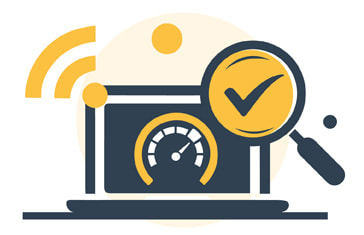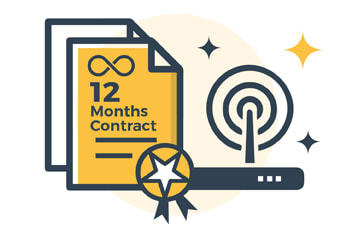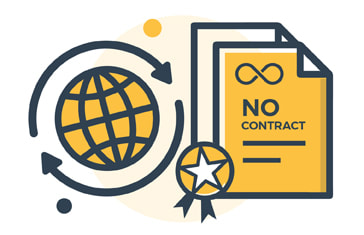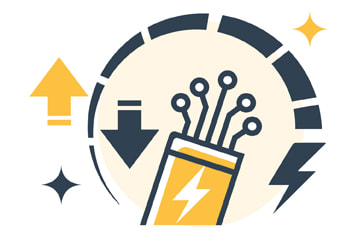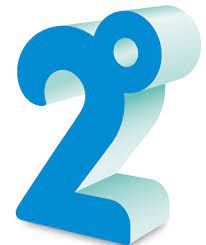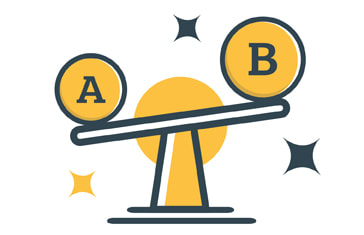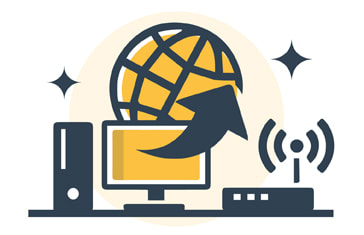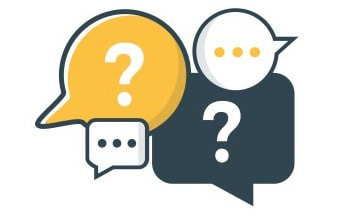Compare Broadband - The Best Plans - July 2024: Find the Right Deal for Your Home
We compare and list the best broadband deals, offers and must-know tips so you can find the right high-speed plan for your home.
Updated 12 July 2024
Know This First: What is a good broadband deal?
- In a nutshell, a good broadband deal is one that works perfectly for your household. We don't want you sorting through 100 or 250+ plans - our focus is getting you what you need while being backed up by great technical support and paying a fair monthly price.
- For most people, this will be a great-value unlimited data plan with a trusted provider. Our shortlist helps you find these.
- In this guide, we outline our favourite broadband plans and why they stand out. We look at different user types and the pros and cons of relevant plans.
- It's a robust list that we stand by. We're focused on shortlisting broadband deals for those living in cities, towns and rural centres. The deals offered are available nationwide and include best-for-purpose options from 10+ trusted and reliable providers.
- Right now, 87% of the New Zealand's population has access to fibre so we don't use a 'find my address' tool. Instead, we shortlist based on the merits of each plan. If you're looking for rural broadband, we have a dedicated guide and plan comparison.
- Please note, 2degrees purchased MyRepublic in early July 2023 - we will be updating the specifics over the month as we review the revised offerings.
In this guide, we outline:
- The Best Fixed Term Broadband Deals Available Right Now
- The Best No Contract Broadband Deals Available Right Now
- The Best Hyperfibre Deals Available Right Now
- How to Compare Broadband Deals - Five Things to Consider
- What Broadband Speed do I Need?
- Broadband Plans - Frequently Asked Questions
Know This First: Fibre vs Broadband Providers
- Chorus and its partners own and manage all the ultra-fast-broadband network, meaning that every broadband provider uses the same infrastructure.
- For this reason, monthly broadband plans are differentiated by 1) speed, 2) data usage limits and 3) cost/terms.
- To protect yourself from a bad experience we have a simple view - sign up to a provider who offers reliable support, flexibility and market-leading pricing.
Important:
- If you have gamers living with you and/or use streaming services like YouTube, Spotify, Netflix and others constantly, and/or work from home more frequently, a good broadband plan is likely to be one that offers unlimited data and fast download speeds.
- Ultimately, the best broadband plan is unique to you. We've presented those we consider to be the best available right now for a range of needs. However, the market is dynamic and you need to take into account the changing needs of your household.
- When searching for the best plan, don't underestimate your data needs. While optional extras such as landlines and streaming services are easy to decide on, data use is not something to underestimate. If you are a household with children, we strongly suggest considering an unlimited data broadband plan to minimize costs (and frustration) later on, should a fixed-data plan be insufficient.
MoneyHub Founder Christopher Walsh outlines our approach and process for comparing broadband:
|
"With fibre now rolled out to around 85% of New Zealand's population, we believe that our shortlist of broadband deals will help eliminate price and plan confusion. We don't want you to pick from 100 or 250+ plans - our shortlist focuses on simplicity, trust and accuracy for a range of needs and budgets. We don't ask for your address or phone number either - what we care about is presenting you with the best deals based on your needs".
"If you're a gamer or ultra-high needs user looking for gigabit download speeds, you might be disappointed if your home can't get that speed due to infrastructure limits. For this reason, it's essential to check your preferred plan is available by contacting the provider directly". "In the video below, I explain how to pick the best broadband plans and what to consider to make the right choice for your needs:" |
MoneyHub Founder
Christopher Walsh |
The Best Fixed-Term Contract Providers and Plans Based on Specific Needs
Important: Broadband is almost always cheaper and faster when you sign up for 12-months. We like fast, reliable plans that offer low or zero setup costs and termination fees (after 12 months). We've shortlisted the top plans which offer excellent pricing for their speed and service.
All the plans below have unlimited data. In selecting the best plans, we have categorised the connection types as follows :
Costs and Freebies: Our table below includes the advertised Monthly Cost. Some plans may charge a connection fee, modem fee and shipping costs. There may also be discounts (such as a sign-up bonus or credit, free months, Netflix subscriptions etc.). We have taken these into account when presenting our results below.
Terms: The contract terms of the plans below are for 12 months, except for Spark Max Wireless Plus (5G plan), which is an open-term term. We have included this plan in the table below because we deem its offering superior to any fixed-term 5G plan available, given the wide network of Spark and that the plan includes Netflix.
All the plans below have unlimited data. In selecting the best plans, we have categorised the connection types as follows :
- ADSL - This category includes ADSL and VDSL, as providers usually charge the same price even if VDSL is much faster than ADSL
- 4G - This includes 4G connections only
- 5G - This includes 5G connections, the speed is usually not disclosed by the provider as it's a rather new technology
- Fibre - These are fibre connections in the range of 30 to 50 Mbps
- Fibre UFB - These are fibre connections known as 'ultra fast' and have speeds of about 300 Mbps
- Max - These are fibre connections of about 900 Mbps
- Hyper - These are fibre connections of 2000+ Mbps
Costs and Freebies: Our table below includes the advertised Monthly Cost. Some plans may charge a connection fee, modem fee and shipping costs. There may also be discounts (such as a sign-up bonus or credit, free months, Netflix subscriptions etc.). We have taken these into account when presenting our results below.
Terms: The contract terms of the plans below are for 12 months, except for Spark Max Wireless Plus (5G plan), which is an open-term term. We have included this plan in the table below because we deem its offering superior to any fixed-term 5G plan available, given the wide network of Spark and that the plan includes Netflix.
Category and Speed |
Top Provider & Packages |
Monthly Cost |
Our View: |
Learn More and View Alternatives |
4G (30Mbps) |
Skinny - Wireless Unlimited [4G] |
$55 |
Skinny is value-focused and offers two free months, $10 off per month when bundling with mobile plans (above $27 per month) and no setup costs. Read our Skinny Review for More Details Runners-up: 2degrees - Unlimited Wireless 4G One NZ - Unlimited 4G Wireless broadband |
|
5G |
One NZ - Unlimited 5G Wireless broadband |
$79 |
OneNZ and 2degrees offer 5G plans at the same price ($79), Spark offers a slightly more expensive ($85) open-term plan that includes Netflix Read our One NZ Review for More Details Read our 2degrees Review for More Details Read our Spark Review for More Details |
|
ADSL (9 Mbps) & VDSL (42 Mbps) |
Skinny - ADSL Unlimited |
$75 |
Skinny offers one free month, $10 off per month when bundling with Skinny mobile plans (above $27 per month) and no setup costs Read our Skinny Review for More Details Runners-up: Slingshot - Standard Broadband Unlimited [ADSL] Bigpipe - Lite (ADSL) |
|
Fibre (50 Mbps) |
2degrees - Fibre Starter |
$60 |
2degrees offers no setup costs (though you'll need to pay for modem shipping) and if you bundle with a 2degrees mobile there's an additional $10 off per month Read our 2degrees Review for More Details Runners-up: One NZ - Fibre Starter [Fibre] Compass - Fibre 50 |
|
Fibre UFB (300 Mbps) |
2degrees - Unlimited [UFB] |
$97 |
2degrees offers a discount for the first 12 months, plus 6 months of Prime Video ($8 per month), $10 off per month when bundling with a 2degress mobile and no setup costs (only shipping for modem) Read our 2degrees Review for More Details Runners-up: Skinny - Fibre Unlimited [UFB] Slingshot - Fibre broadband Unlimited [UFB] |
|
Fibre Max (900 Mbps) |
2degrees -Ultimate Unlimited [Max] |
$109 |
2degrees offers a discount for the first 12 months, plus 6 months of Prime Video ($8 per month), $10 off per month when bundling with a 2degress mobile and no setup costs (only shipping for modem) Read our 2degrees Review for More Details Runners-up: Skinny - Fibre Ultra Unlimited [MAX] Slingshot - Fibre broadband Unlimited Gigantic [MAX] |
Our pricing assumptions:
Know This: Fixed-term contracts are not for everyone. Our guide to the Best Unlimited Data Plans (No Contract) has more plans if you're happy to pay a higher setup cost upfront for flexibility. We have noticed that more providers are moving away from fixed contracts and offering open plans. We see this is a benefit for everyone who wants good value broadband without being tied in to a provider.
- We have assumed in all cases that a modem is being purchased, but some providers let you bring your modem. If you have a modem you can use, you can avoid the modem cost and shipping fee.
- When a provider offers a bundle with mobile, we have assumed that you would switch mobile providers to use the bundled discount.
- We have taken benefits in kind at the value advertised by the providers. Still, you might not consider these valuable if you have no use for a Prezzy card, an antivirus or a particular streaming service like Netflix or Prime Video.
- Please note we have not included discounts for bundling broadband with energy. We consider this a big commitment and think you should evaluate energy providers on their merit. We have, however, included the discounts from bundling broadband with mobile as these can deliver good monthly savings, and mobile services are largely interchangeable.
- We have only included discounts advertised on the provider's website. Still, you might find additional discounts through broadband comparison sites or when you contact the broadband sales team to inquire about their plans.
- When plans had names we considered were not descriptive enough, we added our category in brackets at the end of the plan's name, for example, [UFB].
Know This: Fixed-term contracts are not for everyone. Our guide to the Best Unlimited Data Plans (No Contract) has more plans if you're happy to pay a higher setup cost upfront for flexibility. We have noticed that more providers are moving away from fixed contracts and offering open plans. We see this is a benefit for everyone who wants good value broadband without being tied in to a provider.
The Best Open (No Contract) Providers and Plans Based on Specific Needs
All the open/no contract plans below have unlimited data. In selecting the best plans, we have categorised the connection types as follows :
Costs and Freebies: Our table below includes the advertised Monthly Cost. Some plans may charge a connection fee, modem fee and shipping costs. There may also be discounts (such as a sign-up bonus or credit, free months, Netflix subscriptions etc.). We have taken these into account when presenting our results below.
Terms: The below plans are open plans, meaning there is no contract and you can cancel anytime.
- ADSL - This category includes ADSL and VDSL, as providers usually charge the same price even if VDSL is much faster than ADSL
- 4G - This includes 4G connections only
- 5G - This includes 5G connections, the speed is usually not disclosed by the provider as it's a rather new technology
- Fibre - These are fibre connections in the range of 30 to 50 Mbps
- Fibre UFB - These are fibre connections known as 'ultra fast' and have speeds of about 300 Mbps
- Max - These are fibre connections of about 900 Mbps
- Hyper - These are fibre connections of 2000+ Mbps
Costs and Freebies: Our table below includes the advertised Monthly Cost. Some plans may charge a connection fee, modem fee and shipping costs. There may also be discounts (such as a sign-up bonus or credit, free months, Netflix subscriptions etc.). We have taken these into account when presenting our results below.
Terms: The below plans are open plans, meaning there is no contract and you can cancel anytime.
Category and Speed |
Top Provider & Packages |
Monthly Cost |
Our View: |
Learn More and View Alternatives |
4G (30Mbps) |
Spark - Everyday Wireless Plus (4G Unlimited) |
$65 |
Spark offers great value by including subscriptions to Netflix and excellent coverage Read our Spark Review for More Details Runner up: Skinny - Wireless Unlimited [4G] ($55 per month but with higher modem costs) Read our Skinny Review for More Details |
|
5G |
Spark - Max Wireless Plus (5G Unlimited) |
$85 |
Spark dominates with great value by including Netflix with excellent 5G coverage Read our Spark Review for More Details |
|
ADSL (9 Mbps) & VDSL (42 Mbps) |
Skinny - ADSL Unlimited |
$75 |
Skinny offers the lowest cost overall because even though the setup costs are similar to other providers, their monthly fee is lower Read our Skinny Review for More Details Runner up: Bigpipe Lite (ADSL) |
|
Fibre (50 Mbps) |
One NZ Fibre Starter [Fibre] |
$60 |
One NZ has no setup costs and lets you bring your own mobile, which would be the most cost-effective option for open-term fibre broadband Read our One NZ Review for More Details Runners-up: 2degrees - Fibre Starter [Fibre], offers a similar monthly price but a more expensive modem. |
|
Fibre UFB (300 Mbps) |
Skinny - Fibre Unlimited [UFB] |
$75 |
Skinny offers the lowest cost overall because even though the setup costs are similar to other providers, their monthly fee is lower Read our Skinny Review for More Details Runners-up: Spark - Essential Fibre Plus [UFB] Bigpipe – Starter |
|
Fibre Max (900 Mbps) |
Skinny - Fibre Ultra Unlimited [MAX] |
$90 |
Skinny offers one free month, $10 off per month when bundling with Skinny mobile plans (above $27 per month) and no setup costs Read our Skinny Review for More Details Runners-up: Spark - Max Fibre Plus [MAX] One NZ - Fibre Max [MAX] Voyager - Unlimited FibreMax Broadband Plan [Max] |
Our pricing assumptions:
- We have assumed in all cases that a modem is being purchased, but some providers let you bring your modem. If you have a modem you can use, you can avoid the modem cost and shipping fee.
- When a provider offers a bundle with mobile, we have assumed that you would switch mobile providers to use the bundled discount.
- We have taken benefits in kind at the value advertised by the providers. Still, you might not consider these valuable if you have no use for a Prezzy card, an antivirus or a particular streaming service like Netflix or Prime Video.
- Please note we have not included discounts for bundling broadband with energy. We consider this a big commitment and think you should evaluate energy providers on their merit. We have, however, included the discounts from bundling broadband with mobile as these can deliver good monthly savings, and mobile services are largely interchangeable.
- We have only included discounts advertised on the provider's website. Still, you might find additional discounts through broadband comparison sites or when you contact the broadband sales team to inquire about their plans.
- When plans had names we considered were not descriptive enough, we added our category in brackets at the end of the plan's name, for example, [UFB].
The Best Hyperfibre Plans for Gamers and Homes Who Demand Speed and Power
- We have excluded hyperfibre plans from our fixed contract and no contract analysis above given their niche appeal.
- If you need to load ultra-high-definition video and eliminate latency in gaming, Hyperfibre plans offer the power to run the most demanding applications on multiple devices simultaneously.
- However, Hyperfibre is suitable only for a small minority of the population. It costs more than a regular unlimited data broadband plan, has speeds of 10X to 200X regular fibre plans and is now available in more than 75% of New Zealand towns and cities, with more locations coming online monthly.
2Degrees Hyperfibre
Currently, the only provider to offer Hyperfibre is 2degrees (Orcon no longer have hyperfibre plans).
- 2degrees offers good value because of the perks it gives you when joining a fixed term contract (6 moths free of Amazon Prime and a Prezzy card as a welcome gift)
Best Hyperfibre and Gamer Plans:
|
How to Compare Broadband Deals - Five Things to Consider
We believe that what matters most is reliability, speed, cost and technical support. There's no point saving a few dollars a month and being stuck in a 12-month contract with a poor-performing provider who you can't talk to. Before making any decision about what provider to choose, the following considerations should be made:
1. Check the monthly price
Price is a big factor, but it shouldn't be the only consideration. We don't suggest switching to a provider for free credit or a free month if the plan is more expensive overall. To help you decide what's best for you, the prices in our best broadband deals reflect the best-value options currently available, and we review and update this monthly.
2. Compare download/upload speeds and data limits
Speed is very important, and many broadband providers charge more for plans with higher download and upload speeds. The greater the speed, the more you can do online simultaneously - stream TV, play games and browse as per usual. If you need faster speeds later on, you can usually upgrade with the provider (but not always, so check before signing up). Generally, most plans offered by broadband providers list 'best-available' speeds - actual speed can differ although usually it's not by much.
When it comes to data, plans are either unlimited or capped. Arguably the best plans are unlimited and we have covered these as a priority, but if you don't plan to use 40+ or 60+ GB of data every month, having an unlimited plan means you may be overpaying when there are better value options.
When it comes to data, plans are either unlimited or capped. Arguably the best plans are unlimited and we have covered these as a priority, but if you don't plan to use 40+ or 60+ GB of data every month, having an unlimited plan means you may be overpaying when there are better value options.
3. Check the length of any contract
This is very important - open plans have no contract, meaning you can quit any time, whereas the standard contract term is 12 months. If you cancel before the 12 months, you'll be liable to pay a range of fees (depending on the provider), which can include a modem fee (if the modem was provided for free upfront) and/or an early disconnection fee. These costs can add up, whereas the monthly cost difference between an open plan and 12-month contract can be quite small for some providers.
Students and renters - Your flatmates may not be reliable in helping you pay the bill, and your credit history may be suffer if you get behind in paying. For this reason, an open plan is, more often than not, the best way to go. You'll get complete flexibility and freedom to cancel anytime. Best of all, all the connection and modem costs are paid upfront and your ongoing cost is fixed so you can budget accordingly.
Students and renters - Your flatmates may not be reliable in helping you pay the bill, and your credit history may be suffer if you get behind in paying. For this reason, an open plan is, more often than not, the best way to go. You'll get complete flexibility and freedom to cancel anytime. Best of all, all the connection and modem costs are paid upfront and your ongoing cost is fixed so you can budget accordingly.
4. Understand the setup costs
Setup costs (modem and connection fees) are usually added to open plans but rarely to 12-month contracts. Before signing up to any broadband plan, check the setup costs as they can offset some of the savings you make from a low monthly price. Setup costs will be highlighted before you sign up and will include modem, connection, delivery and other related costs.
5. Be aware of perks, extras, add-ons and bundles
Some broadband providers include add-ons such as Netflix, landline rental, mobile phone contracts and other services. While these can seem attractive, the total cost usually increases if you select them. For example, Netflix costs around $18 a month (see our Netflix review), and you can cancel anytime you stop watching it, whereas, with a bundle deal, you'll indirectly pay for it whether or not you use it.
Know This - Consider deals with free months, reward cards and cashback (but always challenge their 'value')
Know This - Consider deals with free months, reward cards and cashback (but always challenge their 'value')
- In order to make their deals stand out, some broadband providers often advertise rewards or incentives, usually in the form of a free month or discounted initial months.
- Before signing up, quickly add up the 'value' of these incentives - they may not be that worthwhile and they definitely shouldn't rush your decision-making.
Sharing a flat? Don't get caught out by contracts, cancellations and unpaid bills
If you're getting broadband installed into a flat, the best thing you can do is protect yourself from being caught out with big bills and bad credit. We suggest:
- Picking the cheapest and most reliable broadband provider with no contract term - this way, you can disconnect any time without penalty. Flatting situations change, people don't pay and friends move out, and all these things frustrate and/or hurt the account holder directly.
- If your name is on the broadband bill, don't let anyone else have access to the account. Otherwise extra data, upgrades and contract changes could be ordered and leave you liable for the costs.
- It's best to stay on top of payments - it's easy to get behind and stay behind, which costs more with late charges and interest. The broadband provider may also report your credit history; if you miss payments, your credit history will reflect that and it may be harder to get loans, credit cards and even a mortgage later on.
What Broadband Speed Do I Need?
Checking your broadband speed is easy and fast, and important to make sure you have the advertised speed you signed up for and pay for. Our speed test takes less than a minute to complete and you can do it from any browser and device - computers, tablets and phones work equally well. No matter your broadband connection, be it ADSL VDSL, 3G, 4G and fibre, you'll get two numbers - a Download Speed and an Upload Speed. You can make sense of your results using the guide below:
Please be aware:
Broadband Download Speeds:
Broadband Upload Speed
Please be aware:
- Any Fibre 100/20 plan will usually be sufficient for the activities below in a small household (with 100 = 100 Mbps for downloads, and 20 = 20 Mbps for uploads),
- 200/20 plans should be sufficient for larger households. Mobile data plans (i.e. 4G and 5G), such as 30/10 plans, will also be sufficient for most activities although simultaneous use may be an issue
- Gamers and stream-heavy households may need a 900/450 plan, but it does depend on the demands of the users.
Broadband Download Speeds:
- 0.5 Mbps (Mega bits per second) - good for audio streaming, email and very basic web browsing
- 1 Mbps - basic video streaming should work and standard web pages
- 2 Mbps - standard definition (SD) video from YouTube should be possible
- 5 Mbps - High Definition (HD - 1080p) video streaming to run smoothly.
- 8 Mbps - Should be able to support video streaming and other activities at the same time without buffering.
- 15 Mbps - video streams and other activity at the same time.
- 25 Mbps- stream pre-recorded Ultra HD video (UHD - 4k) smoothly.
- 40 Mbps - stream live Ultra HD video (UHD - 4k) smoothly.
- 100+ Mbps - gaming
Broadband Upload Speed
- 0.1 Mbps - send simple text emails.
- 0.4 Mbps - online gaming should be possible
- 0.8 Mbps - video streams over Skype etc should be reasonable quality
- 2 Mbps - HD Webcam streaming may be possible.
- 10 Mbps - uploading 200MB of holiday videos to the cloud will take around 4 to 5 minutes.
What is my current broadband speed?
Check our Internet Speed Test tool; it will tell you the upload speed and download speed. The time of day affects this - for example, it will likely be faster at 4am (when New Zealand is asleep) than 4pm (when school is out and people are at work). As fibre is rolled out to more of New Zealand, the average connection speed at any home or business continues to increase.
What can affect your broadband speed?
There are many factors what affect the broadband speeds. We outline these below:
Know this: To advertise a broadband speed in New Zealand, it only has to be 'experienced' by at least 10% of the people with the same plan. This means 90% can get legally get something lower. In saying this, fibre is a lot more reliable and consistent in speed than VDSL and ADSL so advertised speeds should be more accurate ongoing. As fibre is now available to close to 90% of New Zealand's population, we believe slow speeds and disruptions for non-mobile internet will gradually be a thing of the past for the majority of users.
- Do you have a usage limit? You may have exceeded it and your provider has decreased your speed. Find out for sure by logging into your account and seeing the usage, and make adjustments accordingly.
- Make sure your WIFI is secure - neighbours will be too eager to tap into a free network given half the chance and use your data allowance in the process. There are also security issues with this. So password protect your WIFI network if you currently have an open network.
- Position your router as close to the phone socket as possible - invest in the best quality phone wire available if you have an old cheap existing wire, as high quality wiring can greatly improve speeds.
- Give your WIFI signals space to travel - the nearer you are to the router, the better your signal and the faster the broadband. WIFI signals like open spaces so make sure you remove obstructions between where you access the internet and your router. A central point in your home is a good idea as you'll have the greatest radius. Don't hide the router away or cover it - it needs to be visible so that it can do its job.
- Wires beat WIFI - it may not be as flexible but poor speeds can be improved by using an old-school ethernet cable. Ethernet cables are secure and transfer data faster because, unlike WIFI routers, they don't need to encrypt the data they transmit.
- Electrical interference - routers and WIFI signals don't mix well with other appliances and electrical equipment. To see if your signal is being interfered with, switch everything off except the router and do a speed test. If your speeds go up, electrical devices will need to be moved. Cordless phones, stereos, baby monitors and microwaves can all interfere so , so try to place these away from your router.
- Weak router signals need to be boosted - often the issue comes from the antenna being unsuitable for the shape and size of a house. Get a better antenna or replace the router altogether if it is old, or buy a wireless booster. All of these options extend and sharpen up the signal which can improve the speed.
- Clean the hard drive of your computer, phone and/or tablet - slow internet is often due to slow device and slow devices more often than not are slow because the amount of files on them. If you have a PC, look at installing a trusted anti-virus to make sure spyware isn't sitting on your computer eating up data and slowing your connection down.
- Upgrade your web browser - Internet Explorer, Google Chrome, Mozilla Firefox, Opera and Safari are updated frequently and chances are you're running an old version. Download the latest version. Readers have reported that switching to Google Chrome has greatly improved speeds.
Know this: To advertise a broadband speed in New Zealand, it only has to be 'experienced' by at least 10% of the people with the same plan. This means 90% can get legally get something lower. In saying this, fibre is a lot more reliable and consistent in speed than VDSL and ADSL so advertised speeds should be more accurate ongoing. As fibre is now available to close to 90% of New Zealand's population, we believe slow speeds and disruptions for non-mobile internet will gradually be a thing of the past for the majority of users.
Best Broadband Plans - Frequently Asked Questions
We've listed a number of common questions to help you understand the important aspects of signing up or switching to a broadband plan. If you would like to know something we've not covered, please contact our research team.
What types of broadband are available?
There are several to choose from:
Regions without fibre and mobile will have access to ADSL or VDSL:
- Fibre - the ultimate broadband technology, with speeds up to 900 Mbps. Unlike relying on telephone lines like ADSL and VDSL, Fibre uses fibre optic cable. This means the distance you are to a cabinet or exchange won't affect the download/upload speed. Fibre also includes hyper fibre which is a faster connection (as our hyperfibre guide outlines).
- Mobile broadband (3G, 4G and 5G): Mobile broadband runs off mobile networks, meaning you can connect at home or on the go. It’s very convenient and doesn’t require installing a landline. You can pay-as-you-go by buying a set amount of data or sign up to monthly plans. While it’s convenient, the monthly costs can be a lot higher than broadband plans.
Regions without fibre and mobile will have access to ADSL or VDSL:
- ADSL: The slowest broadband, download and upload speeds vary but are usually around 10Mbps and 1Mbps respectively. ADSL is suitable for web browsing, emailing, and social media - streaming can be a challenge.
- VDSL: this stands for 'Very-high-bit-rate digital subscriber line', which is digital and runs faster than ADSL with download/upload speeds of 60-70Mbps and 5-10Mbps respectively.
How fast will my broadband speed be?
As fast as the plan you sign up for, although speeds are not guaranteed and at time of high usage it may be slower.
Should I get a broadband plan that includes phone and TV?
It’s up to you. With Netflix, Amazon Prime and Disney+ leading the way with content, it’s worthwhile looking at bundle options. Usually, a combo plan is cheaper than separate providers and easier to pay in only one bill. However, you may pay for things you don’t need or use, and/or be tied in to something you no longer need. Our streaming guide has dozens of options that many broadband providers don't offer, many of which are free.
How do I get an open plan/no contract and not over-pay per month for broadband?
A good starting point is choosing an open plan provider that suits your budget. You can then source a compatible modem via Trade Me or Facebook Marketplace and then sign up. This way you limit your upfront cost and can cancel your ongoing costs by giving around 30 days notice.
Can I save money switching provider?
We are committed to making broadband costs transparent. Switching may, and often does, mean you will pay less for your broadband especially if you are currently paying for a service you don't need or isn't suitable.
However, not every decision should be based around price - broadband plans especially. Data speeds, reliability, customer service, data allowances and perks are all significant when deciding whether to switch. MoneyHub is focused on presenting each broadband plan as clearly as possible so you can understand what you're getting and what you'll pay.
However, not every decision should be based around price - broadband plans especially. Data speeds, reliability, customer service, data allowances and perks are all significant when deciding whether to switch. MoneyHub is focused on presenting each broadband plan as clearly as possible so you can understand what you're getting and what you'll pay.
Can I keep my email address if I change provider?
This depends entirely on who your current email provider is. If your email address is from Spark/Xtra or Orcon for example, you'll still have access to your emails up until you switch providers. After that, the email account will likely close (although there are exceptions). To avoid any issues, we suggest registering with a free service, such as Gmail or Outlook, which isn't tied to your broadband provider.
Which broadband provider is the best?
There is no one answer for this question - a broadband provider that is best for you may not be best for your neighbour. It all comes down to your budget, location, and what you want from your broadband plan. For this reason, switching providers needs careful consideration.
Can I get broadband without a phone line?
Yes - Many providers offer "naked" broadband. You can also consider mobile broadband, but the data caps may make it inconvenient or restrictive if you're a regular user. Our guide to naked broadband has more details.
Can I switch at any time? Are there any restrictions and will I pay a penalty?
if you're out of contract on your existing plan, you can switch to a new provider without any hassle. Best of all, there is usually no technical setup - all you need to do is follow the instructions by plugging in the new provider's set. As more and more of New Zealand is fibre-ready, this is a simple process. Cancelling any existing provider is easy - just contact your current provider. Sometimes the new provider will take care of this for you, but as broadband is a contract you're best to make sure your old account is cancelled. Asking for confirmation is a good idea to avoid any billing disputes later on.
Understand Setup and Termination Fees
Understand Setup and Termination Fees
- Some providers charge a setup fee, as well as a penalty fee if you leave before your contract ends. The termination fees range from around $50 to $299 which is significant, so picking a provider that suits your budget and delivers a service you're comfortable with is essential.
- If you are flatting and don't plan to live at the address for longer than a year, make sure you get a plan that has a shorter contract or no contract at all. You may pay more upfront, but no one will be left with an ugly termination fee at the end.
How do I know if I’m out of my existing broadband contract?
Log in to your broadband provider's website and view your account details. You'll then see what your current plan is, and whether or not you're out of contract. If it's not clear, contact your provider and ask if you're under contract, and, if so, when your contract ends.
Does my home have access to fibre?
New Zealand is fairly progressive when it comes to installing fibre, and now close to every home in main centres is fibre-ready. Enter your address in to the Chorus map - you may see that fibre is "planned" but not yet available in your area. You'll also see if you can get VDSL and/or ADSL. If fibre is not available as part of the Government-sponsored UFB programme, you can still get a custom install to your property which you will need to pay for personally.

